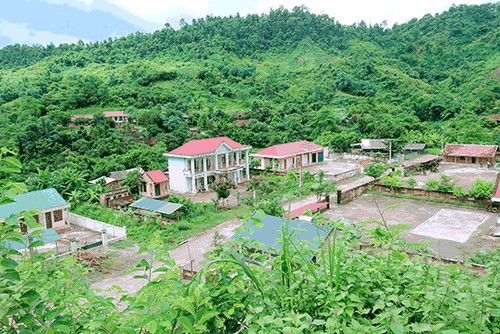
Muong Chien commune in Son La province. (Photo: Vu Tuan/ Son La newspaper)
|
Recognizing that the mountainous terrain and weather of his new home were suitable for farming and raising cattle, in 2007, Dieu Chinh Hung obtained a bank loan of more than 2,000 USD to develop his business.
“After resettling here, I decided to raise cows and grow mangos on the hilly land. Each year, the cows produce enough calves to give me a stable income,” he said.
Cows and buffalos are important assets for people in mountainous areas, but in He hamlet cattle left to graze in the open are vulnerable to diseases. Hung’s cows are kept in cowsheds which are cleaned regularly and are vaccinated against diseases.
“The cattle are vaccinated every two or three months. I also plant 2,000 square meters of land with grass to feed them. I always have cattle food in reserve,” said Hung.
Hung earns an additional 6,500 USD per year from rice, maize, and fishing and is willing to share his experience with his neighbors.
“In Mr. Hung’s production model, cattle are kept in clean breeding facilities. He has showed us various husbandry techniques - how to grow grass, store animal food, and keep the cattle disease-free,” Dieu Van Vinh of Bon hamlet said.
He hamlet has 78 households, including 350 white Thai ethnic people. Since their resettlement in 2006, the number of poor households is down to just 2. Dieu Chinh Hung has been a big part of helping people escape poverty, according Tran Quoc Hung, Chairman of Muong Chien commune in Son La province.
“By replicating Hung’s farming model people in our commune have boosted their incomes and stabilized their lives,” he said.